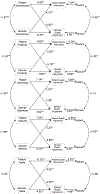Effects of relationship maintenance on psychological distress and dyadic adjustment among couples coping with lung cancer
- PMID: 18823188
- PMCID: PMC9976549
- DOI: 10.1037/0278-6133.27.5.616
Effects of relationship maintenance on psychological distress and dyadic adjustment among couples coping with lung cancer
Abstract
Objective: Relationship maintenance strategies help to ensure the continuation of valued relationships by keeping them at a certain level of intimacy. This study evaluated how lung cancer patients' and spouses' efforts to maintain their relationships affected their psychological and marital adjustment over time.
Design: Psychosocial questionnaires were administered within 1 month of lung cancer treatment initiation (baseline) and 3 and 6 months later to 158 lung cancer patients and their spouses.
Main outcome measures: Study outcomes were global severity index scores on the Brief Symptom Inventory, and total scores on the Dyadic Adjustment Scale.
Results: Multilevel modeling analyses using the Actor-Partner Interdependence Model showed that, regardless of gender or social role (i.e., patient or spouse), individuals who engaged in the strategies of positivity, networks, and shared tasks reported less distress at baseline than other participants. Over time, the effects of providing more assurances and experiencing a partner's increased reliance on social networks differed: patient distress was exacerbated, and spouse distress was alleviated. Couples where both partners engaged in more frequent maintenance behaviors reported greater dyadic adjustment at baseline and over time.
Conclusion: For couples coping with lung cancer, the initial treatment period may be an important time that sets the tone for future spousal interactions. Engaging in relationship maintenance during this stressful time may help mold more resilient relationships and facilitate adjustment as the disease progresses.
PsycINFO Database Record (c) 2008 APA, all rights reserved.
Figures


References
-
- American Cancer Society. (2007). Cancer Facts & Figures 2007. Atlanta: American Cancer Society.
-
- Ayres J (1983). Strategies to maintain relationships: Their identification and perceived usage. Communication Quarterly, 31, 62–67.
-
- Badr H, & Carmack Taylor C (2006). Social constraints and spousal communication in lung cancer. Psycho-Oncology, 15(8), 673–683. - PubMed
-
- Banthia R, Malcarne VL, Varni JW, Ko CM, Sadler GR, & Greenbergs HL (2003). The effects of dyadic strength and coping styles on psychological distress in couples faced with prostate cancer. Journal of Behavioral Medicine, 26(1), 31–52. - PubMed
-
- Bodenmann G (1997). Dyadic coping - a systemic-transactional view of stress and coping among couples: Theory and empirical findings. European Review of Applied Psychology, 47, 137–140.

